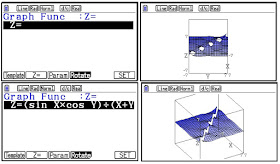Casio fx-CG 10, fx-CG 20, fx-CG 50 Update to Software Version
3.1
If you want to see my original review of the fx-CG 50,
please click here:
What’s New with Software Version 3.1
Major Graph3D App
Update!
Wow! Casio hit it out
of park with their updated 3D Graph mode.
When I first reviewed the Casio fx-CG 50 last June, one of the
new features highlighted was the 3D Graph mode.
At the time, the mode was limited to lines, planes, spheres, and
cylinders. A good start, but limited
mode.
Not anymore. First,
the update added cones to the template.
The 3D Graph mode has become an official graphing mode
because the mode now has functional graphing in the form of Z(X,Y).
It doesn’t stop there.
The mode also offers parametric graphing in the form of (X(S,T), Y(S,T),
Z(S,T)). This might be my favorite part
of the Graph 3D app.
Finally, you can rotate Y(X) functions either by X or Y
axis, to give a really neat visualization of functions.
The update adds analysis for planes and lines. Analysis includes intersection points and relational
type analysis (intersection vs. orthogonal vs. rotational vs. parallel, etc.)
QR Codes Added to the
Catalog
QR (Quick Response) codes, those small square bar codes that
people scan with their smartphones to connect to certain webpages, have been
added to most of the commands in the Catalog.
Any QR reader should do. A successful
reading of the bar code leads to Casio’s online manual.
Count on Casio continuing the use of QR codes, in both
graphing and non-graphing models. Recall
that the fx-991 EX Classwiz has QR codes to display stat plots and screen shots
through Casio’s Casio EDU+ software and app.
Yes, QR codes generated by the catalog can be read by the
Casio EDU+ app.
For more details, click here:
Wish List
I wish in the next update, Casio increases the number of
colors to display text and graphs, currently there are still seven (black,
blue, red, magenta, green, cyan, and yellow).
At least put an RGB function.
I think a differential equation graph mode or type would fit
well with this series, even if it is just in the form of y’ = f(x,y,constants)
and the Runge Kutta 4th order method is used.
I suspect the next hardware of this series will have memory
increased to at least 256MB or more.
This series of calculators deserves to have such increase because of all
the great things this series offers!
Download Links
Software Update: https://edu.casio.com/download_service/en/download/index.html
Please keep in mind you will need to install the Graph3D for
the fx-CG 10 and fx-CG 20 Add-In separately.
The Graph3D already comes with the fx-CG 50.
The era of third-dimensional graphing is here to stay!
Eddie





